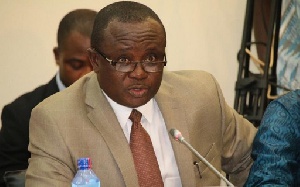The First Deputy Speaker of Parliament, Joseph Osei-Owusu has expressed utter shock at a whopping US$4.5m consultancy fee that is expected to be paid to monitoring consultancy and a monitoring consultant over a six-year period.
His comments follow Parliament’s approval of a report of the Finance Committee on the Financing Agreement between the government of Ghana and the International Development Association(IDA) for an amount equivalent to One hundred and ten million, six hundred thousand Special Drawing Rights(SDR 110,600,00) [US$150.0Million Equivalent] to finance the proposed Transport Sector Improvement Project(TSIP).
Out of US$150.0million loan facility, US$4.5million under component 2 of the project will have to do with payments of US$2.00m to a monitoring consultancy and US$2.50m to a monitoring consultant respectively.
These payments have hit both the First Deputy Speaker, Joseph Osei-Owusu and the ranking member on Finance, Cassiel Ato Forson hard.
According to the First Deputy Speaker, the country will not get any value for money from such expenditures.
“We should review what we intend to use the loan for, I have looked at particularly the component dealing with Road safety, DVLA, NRSC, the huge stock that from my experience, Ghana will not get any value for money from those expenditures. All those things they call consultancy [first if it is not given to a company that is Ghanaian, they will never get the approval to spend it and the companies that are coming from outside, they are coming from practically the lenders and they don’t give you value,” he said.
He also added that all monies programmed for consultancies and studies should be turned to infrastructure.
“At the end of the tenure, you will pay the loan and you will have nothing to show to Ghanaians. Ghanaians will not know that there is some manoeuvring to take part of the money back to the lender without giving any value. We should take the loan but invest not less than 80percent of that loan into road infrastructure and not the consultancies that have been put there”.
He urged the Finance Committee to review the arrangement and take the money for road infrastructure and not for consultancies which cannot be justified.
On his part, the ranking member on Finance, Cassiel Ato Forson, also condemned the expenditure.
 Ranking member on Finance, Cassiel Ato Forson
Ranking member on Finance, Cassiel Ato Forson
“The question is; what is the difference between monitoring consultant and monitoring consultancy [$2m and $2.5m]. In one breath we are monitoring the consultant, so who monitors the consultant. Mr.Speaker, $4.5m cannot be allowed to be spent this way”.
US$150m facility justified
However, the chairman of the Finance Committee, Dr.Mark Assibey-Yeboah who justified the facility explained that about 89.1 percent of the loan agreement is going into infrastructure.
“There was a thorough job done at Committee, we had the Roads and Transport Ministries, this is a World Bank facility, the terms are generous and for anybody to suggest that we are approving money, maybe one time some Norwegian funds came which didn’t go to do what was expected, but this is coming from the World, this is the project appraisal document, I don’t find anything wrong with this facility and I think Parliament should give its full blessings to this facility” he said.
 Chairman of Parliament's Finance Committee, Dr. Mark Assibey-Yeboah
Chairman of Parliament's Finance Committee, Dr. Mark Assibey-Yeboah
The objective of the Project is to support the development of road infrastructure, improve road safety, and strengthen the capacity of the sector agencies and to foster regional integration.
The proposed TSIP has been developed to, among others, support development of road infrastructure, improve road safety, strengthen the capacity of the sector agencies and to foster regional integration.
The Project thus aims to: reduce travel time on selected parts of the classified road network in Northern Ghana, promote road safety and strengthen the institutional management of the transport sector.
The Project is divided into three broad components and will be implemented over a six-year period.
Component 1 – Road Asset Preservation: This component will support the development of road infrastructure in the Northern part of Ghana. The road stretch from Tamale to Yendi and Tatale(about 103km of paved and 67km of unpaved road) will be rehabilitated to improve the road network in an integral part of the Central East-West corridor.
Component 2- Improved Road Safety; It covers activities to be implemented by both the National Road Safety Commission (NRSC) and the Driver and Vehicle Licensing Authority (DVLA).
Component 3 –Institutional Strengthening and Capacity Building: This component will support an institutional review of the agencies with the aim of restructuring the road and transport.
Among the expected benefits of the project according to the report is the reduction of travel time on the estimated 370km roads to be rehabilitated/upgraded and strengthen the institutional management of the transport sector by employing performance-based contracting methodology (PBC).
The project will also create job opportunities during the rehabilitation of the road network and the share of rural population with access to an all-weather road increased.
Again the feeder roads to be constructed under the project will help link agricultural value chains so as to provide access to markets and support agribusiness.
Business News of Friday, 13 July 2018
Source: thebftonline.com

















